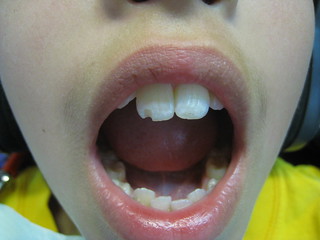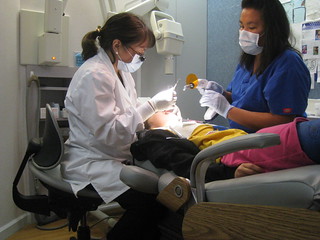 People suffer from various types of dental issues, some of which are more complicated to fix than others. Fortunately, thanks to modern innovations in dentistry, there are ways that dentists can address virtually any type of dental problem imaginable. One of the types of dental issues that couldn’t traditionally be addressed back in the early days was a chipped tooth. Now, though, if people happen to chip one of their teeth, there are measures that they can take to get their smiles back to their aesthetically-pleasing appearances.
People suffer from various types of dental issues, some of which are more complicated to fix than others. Fortunately, thanks to modern innovations in dentistry, there are ways that dentists can address virtually any type of dental problem imaginable. One of the types of dental issues that couldn’t traditionally be addressed back in the early days was a chipped tooth. Now, though, if people happen to chip one of their teeth, there are measures that they can take to get their smiles back to their aesthetically-pleasing appearances.
What Is a Chipped Tooth?
A chipped tooth is a bit different from a broken or cracked one. As its name implies, a chipped tooth usually just has a tiny chip in it that gives it an uneven edge. In fact, chipped teeth account for the majority of dental injuries treated for in the nation. While there might be some pain associated with a chipped tooth, oftentimes the most annoying aspect about a chipped tooth is the uneven appearance that it gives people’s teeth, especially if their chipped tooth is located in the front of their mouths where it is clearly visible when they speak, smile or laugh.
Causes of a Chipped Tooth
There are numerous potential causes of a chipped tooth. Perhaps some of the most common causes include sporting injuries, being hit in the face or mouth, biting down on something extremely hard, falling and hitting the tooth (causing it to chip) and even having cavities that weaken the tooth and causes it to chip. When a tooth becomes chipped, the impact may or may not hurt. In many cases, people experience no pain when their teeth become chipped. However, their tongues usually feel the sharp stab of the chipped off portion of the tooth, and that’s what usually ends up alerting them to the fact that their tooth has become chipped. In other cases, however, if a large portion of the tooth becomes chipped, then some of the nerve endings within the tooth might become damaged, which can be painful.
Ways to Fix a Chipped Tooth
 Numerous ways exist to fix a chipped tooth, but the method that a dentist recommends most often is directly related to how serious the chip is. For minor chips, dentists usually suggest reattaching the broken piece of the tooth back to the chipped tooth with a dental resin. Of course, this method is only possible if the patients have retained the chipped portions of their teeth. This is why it’s always important for patients to retain any portions of their chipped teeth that they can instead of simply throwing them away.
Numerous ways exist to fix a chipped tooth, but the method that a dentist recommends most often is directly related to how serious the chip is. For minor chips, dentists usually suggest reattaching the broken piece of the tooth back to the chipped tooth with a dental resin. Of course, this method is only possible if the patients have retained the chipped portions of their teeth. This is why it’s always important for patients to retain any portions of their chipped teeth that they can instead of simply throwing them away.
Another method for fixing a minor chipped tooth is to repair the chipped portion with a dental filling material that can make the tooth have an even appearance once again and can also relieve any pain or discomfort associated with the chipped portion of the tooth. Still, in other cases, if the chip is extremely small, the dentist might suggest simply polishing and smoothing out the chipped portion. In more severe cases of chipped teeth, dentists might recommend simply placing a crown over the tooth to improve its appearance as well as to help protect the chipped tooth from sensitivity that can be caused by exposure to air or hot or cold foods and fluids.
How to Care for a Chipped Tooth
People can care for their chipped teeth at home with self-care measures until their dentist appointments arrive to manage any pain associated with the tooth and to help protect the tooth from further chipping. First of all, if the tooth is painful, consider taking some over-the-counter pain medications such as acetaminophen or naproxen, and always be sure to rinse the mouth with salt water. Additionally, people with chipped teeth should avoid eating hard foods. Stick with soft foods or fluids like soup, and avoid biting down on the chipped portion of the offending tooth.
References:
American Association of Endodontists. “Cracked teeth.” Retrieved on February 9, 2016, from http://www.aae.org/patients/symptoms/cracked-teeth.aspx/.
Colgate. “Fractured and broken teeth.” Retrieved on February 9, 2016, from http://www.colgate.com/en/us/oc/oral-health/conditions/dental-emergencies-and-sports-safety/article/fractured-and-broken-teeth.
American Association of Endodontists
211 E Chicago Ave
Suite 1100
Chicago, IL 60611-2691
800-872-3636 (U.S., Canada, Mexico) or 312-266-7255
www.aae.org
Colgate
300 Park Ave
New York, NY 10022
212-310-3000
http://www.colgate.com
Images:
https://farm4.staticflickr.com/3095/3126772486_0046c6a52e_n.jpg
https://farm4.staticflickr.com/3107/3125950705_af1b6dfd05_n.jpg